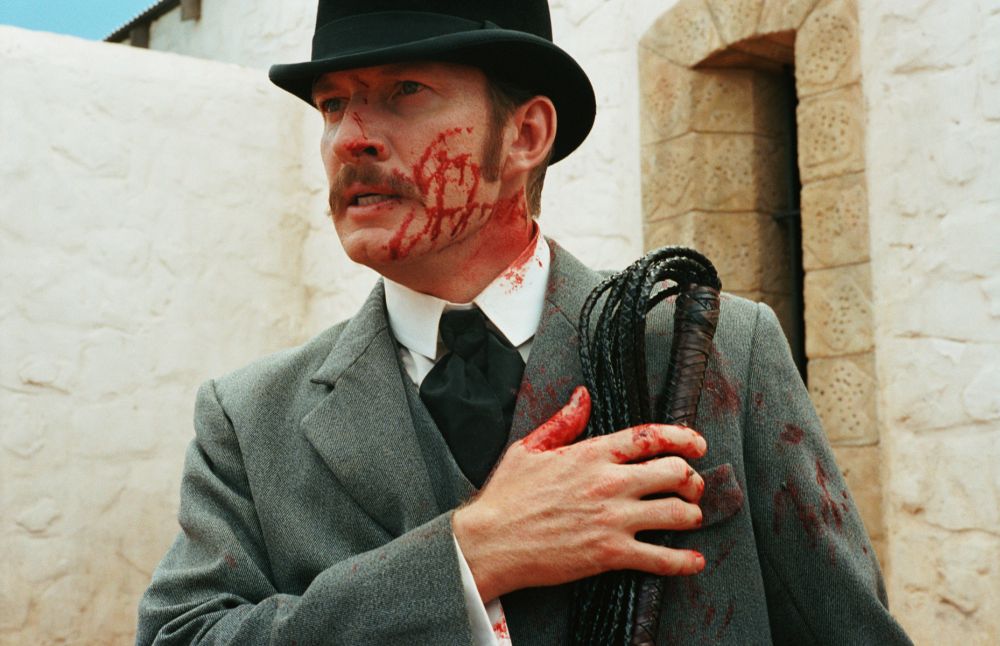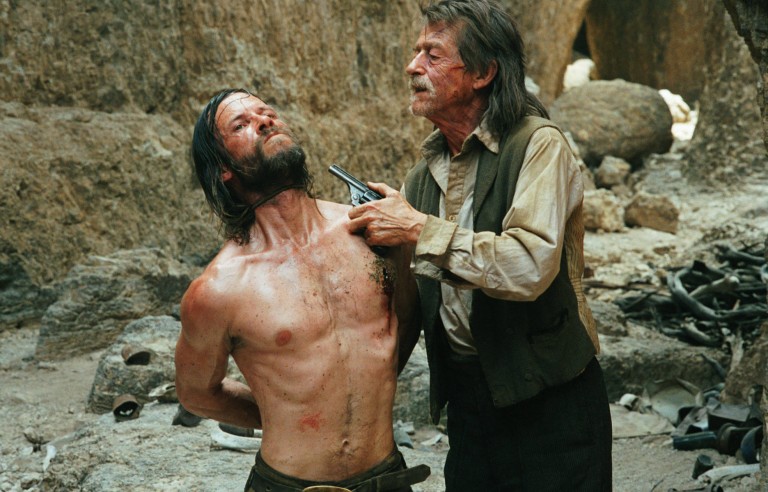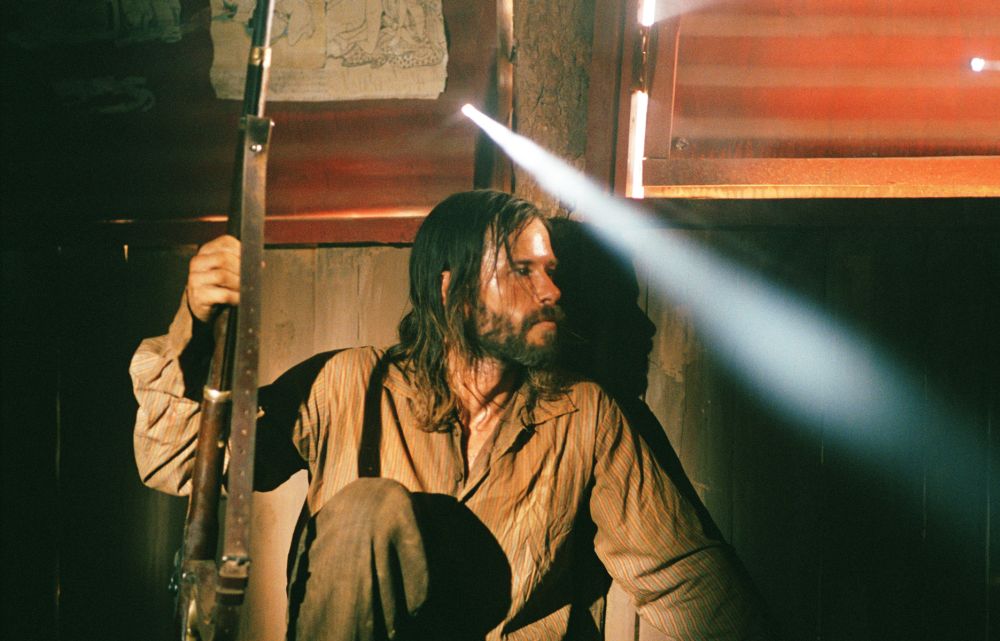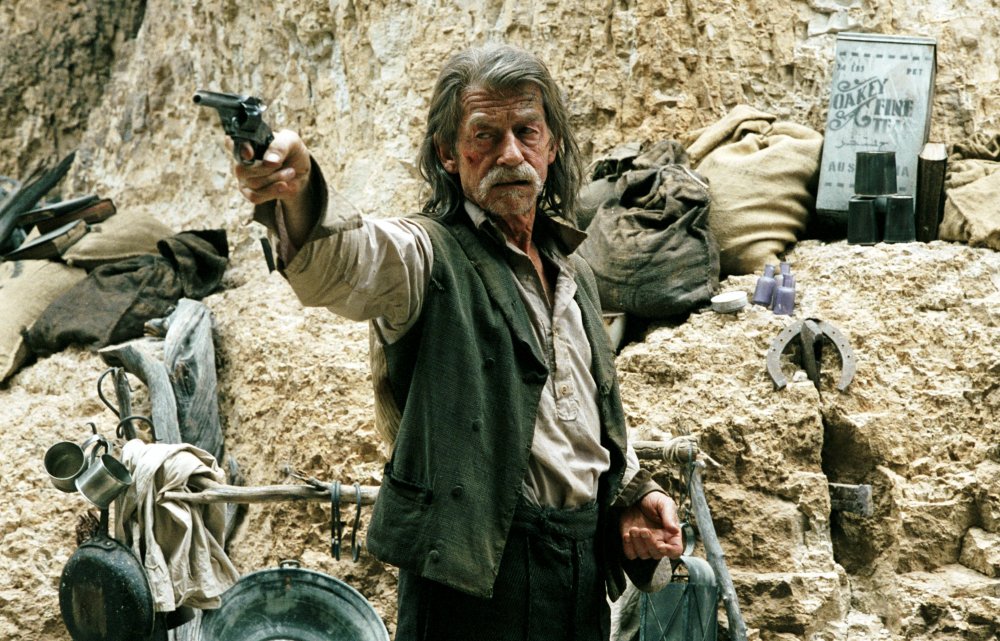5. The Mixture of Beauty and Violence

There are some truly beautiful scenes in The Proposition. Arthur completes a daily ritual of staring into the sunset. The rich warm pallet over the flat, scorched earth stretches on past the limits of the screen. The images of lone homes surrounded by the endless abyss of yellow are captivating in their simplicity and scale. The nighttime scenes, with stars that stretch for seemingly 360 degrees, are both ominous and seductive.
For much of the film, violence happens off screen, showing viewers only the bloody aftermath, which at times is certainly gory. Some scenes however, namely the Mikey whipping scene, the attack by Arthur on a police officer, and the climactic encounter between the gang and the Stanleys, push the violence into the viewer’s gaze.
Perhaps the starkest juxtaposition between beauty and violence occurs with the proper attire, decorations, and mannerisms of the few members of the British aristocracy when compared to the untamed nature of the place and most of its residents. Martha Stanley wears formal dresses and serves tea in pristine China. She and the detestable Eden Fletcher (David Wenham), who runs the town, stand out as alien amongst the ragged and dilapidated backdrop.
6. The Grittiness

Amongst, and sometimes overshadowing, the beauty of The Proposition is an unrelenting grittiness that helps define the work. Most characters, particularly Charlie, are covered in so much dirt and filth that audiences can almost smell them through the screen. Teeth are hardly discernable beneath the pronounced layers of yellow tartar and plaque. Greasy long hair and beards adorn most of the men and bleed directly into ill-fitting clothes covered in even more dirt and grime.
Flies are an omnipresent nuisance in the film. A number of shots close in on solid blankets of black insects adorning the hats, shoulders, and backs of anyone who stands still long enough for them to gather. They buzz around faces and land on food. A couple of shots of the town’s butcher shop would make any health inspector have nightmares for weeks.
Contributing to the grittiness is the crudeness with which most of the men talk. Likewise, every male character appears to consume alcohol as their primary sustenance. They are all painted as rough men who would quickly turn to violence with little provocation.
7. The De-Mystification of the Genre

Starting in the ‘60s, a number of Westerns began to challenge the romantic vision of the frontier that classic Westerns had come to rely on. Most notably in Sam Peckinpah’s The Wild Bunch, Westerns began to paint a rougher, less heroic version of the genre. This mantle was picked up with the popularity of the film versions of Cormac McCarthy’s contemporary Western novels, particularly No Country for Old Men.
The Proposition, for many reasons already examined, plainly challenges nostalgic ideas of a so-called simpler time. What makes this film especially interesting in de-mystifying the genre is its challenge of the glorified notion of the Australian bushranger. The most famous of all Aussie outlaws is Ned Kelly, who has long served as something of a folk hero in Australian lore. His treatment in film has been customarily heroic, as he battled against unjust police forces.
When looking at The Proposition, Arthur Burns, who is the leader of a gang of outlaws battling police, stands in as the defiant bushranger. Audiences are certainly not encouraged to view him nobly. He is a sociopath who must be stopped. Even though the police force is undoubtedly corrupt, viewers do not want Arthur to succeed in his violent plans, thus challenging the Robin Hood-esque image of the bushranger.
8. The Acting

With all of the focus on setting, tone, and theme, it is easy to overlook the extraordinary acting across the board in The Proposition. Guy Pearce shines in his role as Charlie. He shows his internal conflict through muted gestures and facial expressions. He speaks little, somewhat in the mold of the classic cowboy. We know that there is some good in him, and Pearce is able to embody this while conveying an outward appearance of menace.
The always underappreciated Ray Winstone is fantastic in capturing the simultaneous drive and self-doubt of Captain Stanley. His emotional eyes often betray his otherwise brute appearance. Beneath his professed mission to civilize the Outback is the deep desire to protect his wife and guard her innocence. Winstone exudes the emotional toll that his impossible task has placed squarely upon his shoulders.
Although getting less screen time, Danny Huston also jumps off the screen in his portrayal of the unhinged Arthur. Normally relegated to elitist, pretentious characters, Huston, with his wild hair draped over his dirty face, captures the essence of a man who has found all forms of violence increasingly attractive. He wavers off into meandering monologues while he stares unblinkingly into the horizon.
Also, not to be ignored, are a number of indigenous actors, primarily Tom E. Lewis and David Gulpilil, who give nuanced performances that provide insight into the disastrous plight of the Aborigines in this time period. Emily Watson additionally embodies the proper British woman, who is somehow intrigued and titillated by the dangers surrounding her. John Hurt steals his two scenes as the beleaguered bounty hunter who despises the land he is now in. Each performance brings emotion, rawness, and realism to the film.
Bonus: Nick Cave
If the 8 reasons examined above were not enough to solidify The Proposition as a classic, consider this: it was written by Nick Cave…as in Nick Cave and the Bad Seeds Nick Cave…as in “The Prince of Darkness” Nick Cave. Here, the grittiness, bleakness, and moral ambiguity make total sense.
Along with writing the screenplay, he collaborated with fellow Bad Seeds band member Warren Ellis to score the film, adding to the minimalistic feel and then cutting through it dramatically to mirror the action. The sound production of the film only serves in adding to its greatness.
Author Bio: Cole Gelrod is an English educator and freelance writer. He lives in Denver, CO.